Mgmt 3102 1 Study guides, Class notes & Summaries
Looking for the best study guides, study notes and summaries about Mgmt 3102 1? On this page you'll find 6 study documents about Mgmt 3102 1.
All 6 results
Sort by
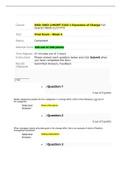
-
MGMT-3102-1 Week 6 Final Exam (100% Correct)
- Exam (elaborations) • 5 pages • 2021
-
- $10.49
- + learn more
1. Question: Nadler categorizes people into four categories in a change effort, which of the following is not one of the categories: 2. Question: When managers clearly articulate goals in the change effort, this is an example of which of Nadler's management practices? 3. Question: When Quinn gives the advice to fire yourself on Friday, he means: 4. Question: During the consolidation stage, there are three basic issues that Nadler identifies that managers must address. These are: 5. Questio...
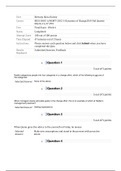
-
BUSI-3003-1, MGMT-3102-1, Dynamics of Change; Week 6 Final Exam 20/20 Correct (Fall Qtr)
- Exam (elaborations) • 5 pages • 2020
-
- $13.99
- 2x sold
- + learn more
1. Question: Nadler categorizes people into four categories in a change effort, which of the following is not one of the categories: 2. Question: When managers clearly articulate goals in the change effort, this is an example of which of Nadler's management practices? 3. Question: When Quinn gives the advice to fire yourself on Friday, he means: 4. Question: During the consolidation stage, there are three basic issues that Nadler identifies that managers must address. These are: 5. Question: Wh...
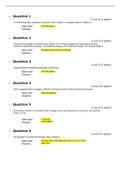
-
MGMT-3102-1 Week 3 Midterm Exam (100% Correct)
- Exam (elaborations) • 2 pages • 2021
-
- $15.49
- + learn more
1. Question: In confronting deep change at a personal level a leader or manager needs to reflect on: 2. Question: There are five stages of discontinuous change. Four of these stages are: developing a shared direction, implementing change, consolidating change, and sustaining change. The missing stage is: 3. Question: Organizational competitive advantage comes from: 4. Question: Quinn suggests that to engage in effective change we need to take embrace and accept: 5. Question: According to Qui...
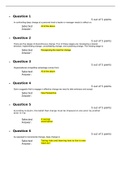
-
MGMT-3102-1 Week 3 Midterm Exam (100% Correct
- Exam (elaborations) • 2 pages • 2021
-
- $10.49
- + learn more
1. Question: In confronting deep change at a personal level a leader or manager needs to reflect on: 2. Question: There are five stages of discontinuous change. Four of these stages are: developing a shared direction, implementing change, consolidating change, and sustaining change. The missing stage is: 3. Question: Organizational competitive advantage comes from: 4. Question: Quinn suggests that to engage in effective change we need to take embrace and accept: 5. Question: According to Qui...
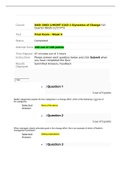
-
MGMT-3102-1 Week 6 Final Exam (100% Correct)
- Exam (elaborations) • 5 pages • 2021
-
- $23.49
- + learn more
1. Question: Nadler categorizes people into four categories in a change effort, which of the following is not one of the categories: 2. Question: When managers clearly articulate goals in the change effort, this is an example of which of Nadler's management practices? 3. Question: When Quinn gives the advice to fire yourself on Friday, he means: 4. Question: During the consolidation stage, there are three basic issues that Nadler identifies that managers must address. These are: 5. Questio...
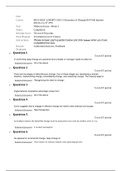
-
BUSI-3003-1, MGMT-3102-1, Dynamics of Change; Week 3 Midterm Exam 10/10 Correct (Fall Quarter)
- Exam (elaborations) • 2 pages • 2020
-
- $17.99
- + learn more
1. Question: In confronting deep change at a personal level a leader or manager needs to reflect on: 2. Question: There are five stages of discontinuous change. Four of these stages are: developing a shared direction, implementing change, consolidating change, and sustaining change. The missing stage is: 3. Question: Organizational competitive advantage comes from: 4. Question: Quinn suggests that to engage in effective change we need to take embrace and accept: 5. Question: According to Quinn, ...



